This is the powerful speech delivered by former Supreme Court Justice V. Gopala Gowda at the launch event of the book Madhayaanai (The Rogue Elephant), authored by Tamil Nadu’s Education Minister Anbil Mahesh Poyyamozhi. The event, held under the leadership of Hon’ble Chief Minister M. K. Stalin, served as a platform to voice strong opposition to the National Education Policy 2020. Justice Gowda’s address emphasized constitutional values, federalism, social justice, and the urgent need to resist policies that undermine the rights of states and marginalized communities.
Makkal Manthil Kudiyirukkum thiru M K Stalin hon’ble chief minister of Tamil Nadu state, young and energetic deputy chief minister Udhayanidhi Stalin, the author of a great book on NEP: Madhayaanai – Anbil Mahesh Poyyamozhi.
Respected honourable Mr Digvijaya Singh, the former chief minister of Madhya Pradesh state the chairman of parliamentary committee of education. Dr Myslwamy Annadurai who has just given the speech.
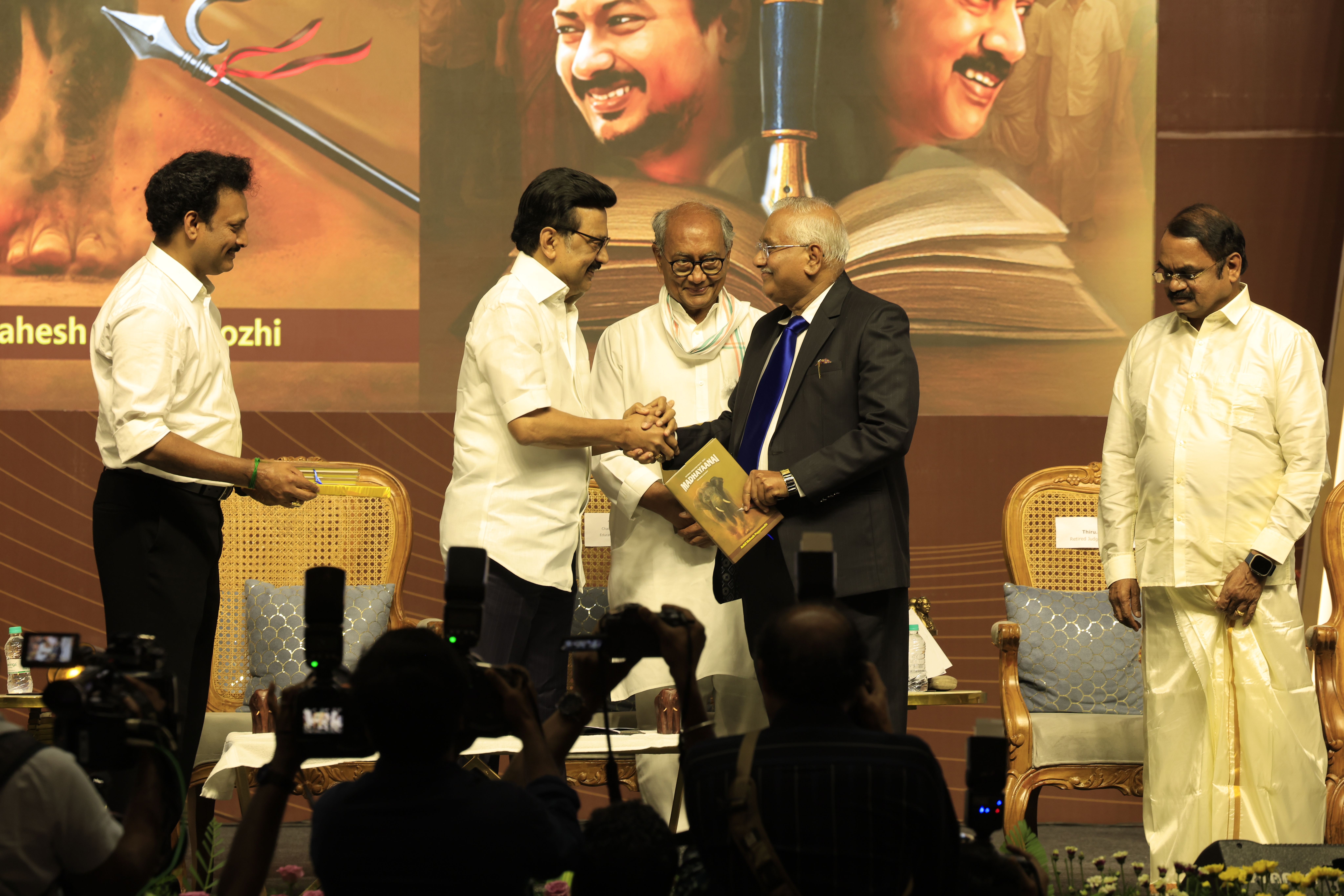
All the cabinet ministers who are in the audience, the honourable parliament members of Tamil Nadu, my good old friend N Ram, we were together in the students federation of India, Mr. Wilson the senior advocate who is responsible for my coming to this function.
Large number of my young and energetic youth who were present in this Great Hall, my loved affectionate children in large number you are all in the heart of the Chief minister Mr Stalin and the education minister.
At the outset I must congratulate Mr Anil Mahesh Poyyamozhi for having authored this book today which has been launched by honourable chief minister Mr Stalin. This is an eye opener in the entire country today, which is required to be debated. discussed and take forward to oppose this national education policy in India which has been formulated in 2020 ignoring the federal feature of the constitution According to Article 236 of the Indian Constitution (1976), Entry 25—pertaining to education—was moved to the Concurrent List (List III) of the Seventh Schedule. Nonetheless, state governments continue to have a significant role in matters related to education. This position was reinforced by the historic judgment delivered by the Constitution Bench of the Supreme Court of India in the case of Unnikrishnan vs. State of Andhra Pradesh, reported in 1993 (SCC p. 645). In this landmark ruling, the Hon’ble Supreme Court held that elementary education is a fundamental right under the broader framework of the right to education. The Court emphasized that the content and parameters of this right must be interpreted in light of Articles 41, 45, and 46 of the Directive Principles of State Policy, which are supplementary to the fundamental rights guaranteed under Part III of the Constitution. This is an example of judge-made law, where the Court interpreted the constitutional scheme, philosophy, and intent embedded within the Constitution of India—a document the Supreme Court once referred to as a “great political document.” Later, in Essar Mumbai vs. Union of India (1994), the Court reiterated the importance of educational rights. Following these interpretations, in 2002, Article 21A was inserted into the Constitution of India, mandating free and compulsory education for all children. This provision recognizes that the children of this great country—who will eventually take the reins of leadership—must be equipped through education to become responsible and informed citizens of India.
Ignoring the constitutional philosophy of pluralism, cultural values, and the concept of social justice—which the Supreme Court declared as the basic structure of the Constitution in the landmark Kesavananda Bharati case in 1973—is unacceptable. In that historic judgment delivered by a 13-judge Constitutional Bench, the Court held that social justice forms part of the Constitution’s unamendable core. No authority, including Parliament—which has only limited powers under Article 368—can alter or amend this basic structure.
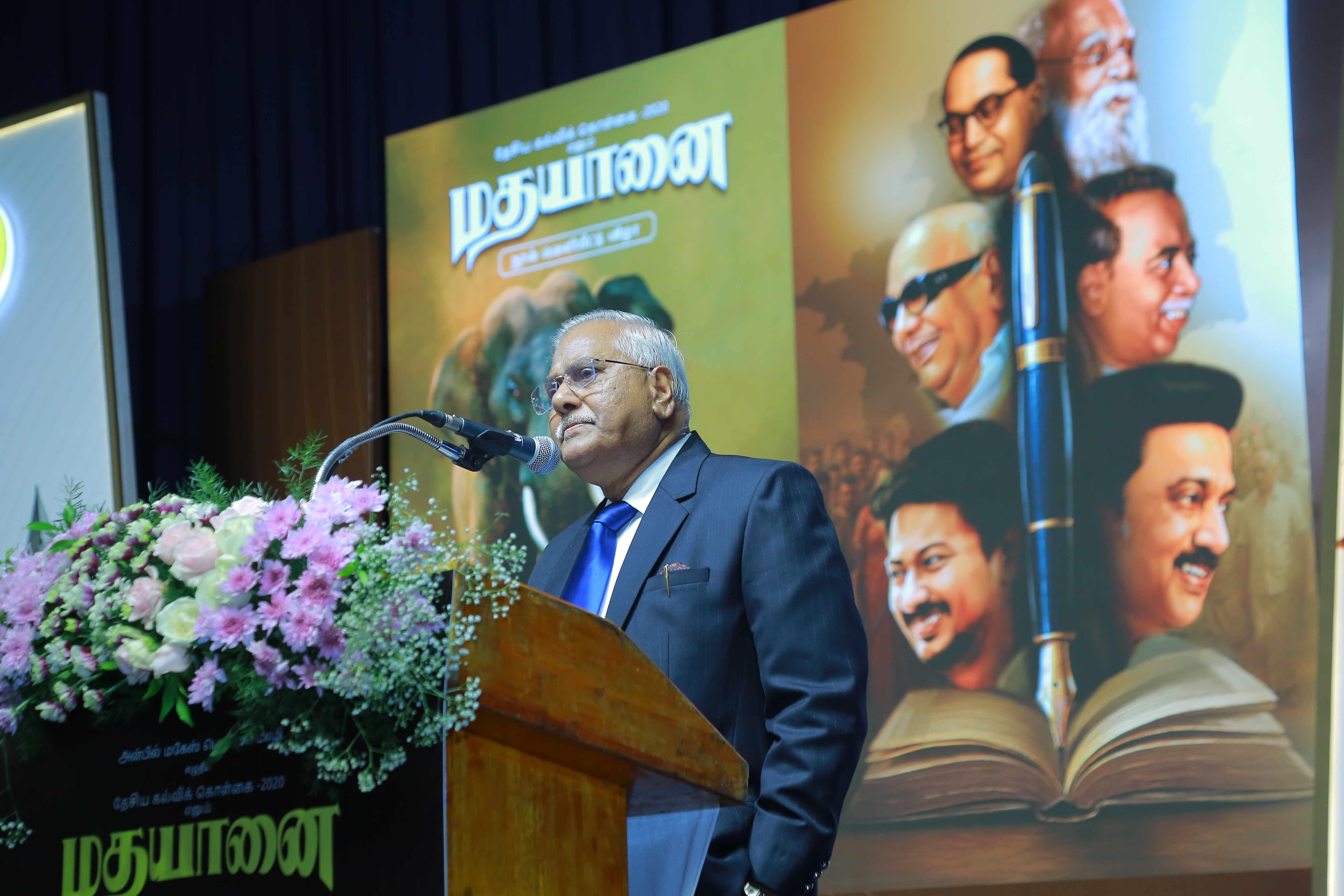
The constitutional values of cultural diversity, pluralism, and social justice cannot be bulldozed by imposing policies that are unacceptable to the people of this country. A National Education Policy that fails to reflect or uphold these foundational ideals does not serve the purpose of the Constitution. Therefore, at this critical juncture, I must congratulate the author of this important work—our Hon’ble Minister—who demonstrates unwavering commitment, creative vision, and a proud political legacy. His grandfather was a politician, his father was a politician, and now he too carries that legacy forward as a committed public servant working under the leadership of Chief Minister Stalin. I must also congratulate the Hon’ble Chief Minister of Tamil Nadu, Thiru M. K. Stalin, who today stands tall in Indian politics. He has played a pivotal role in upholding constitutional values, particularly in relation to a historic judgment recently delivered by the Supreme Court of India in the case of State of Tamil Nadu vs. Government of India. This judgment will be remembered in the annals of Indian constitutionalism and democracy. It reaffirmed that when a bill is passed by a State Legislative Assembly based on the advice of the Council of Ministers, it is the constitutional duty of the Governor and the President of India to give their assent. Signing the bill is not optional—it is mandatory. This is what the Constitution demands.
Let us be clear: it is not the Legislature that is supreme, nor the Judiciary, nor the Executive. It is the people of this country who are supreme and sovereign.
The mandate of the people is given to the State Legislature, which forms the government. That government frames laws, and it is accountable and answerable to the people. The elected representatives act on behalf of the people. The Governor, as a constitutional authority and nominee of the President of India, must act within the boundaries of the Constitution. He is duty-bound to approve bills duly passed by the elected Assembly. The Supreme Court, in this historic judgment, has upheld this principle and corrected the misuse of power by Governors who, by holding bills for one-and-a-half to two years, hindered the functioning of elected governments and undermined the will of the people.
Under the dynamic leadership of Chief Minister Stalin, Tamil Nadu has shown constitutional resilience. For this, too, I extend my heartfelt congratulations to him. Moreover, I commend his courage and conviction in taking a strong stand against the Union Government on the issue of population-based delimitation. He has clearly stated that reducing the number of parliamentary seats for southern states like Tamil Nadu based on population will not be accepted. In doing so, he has taken the lead—and I firmly believe he will continue to provide leadership at the national level in the times to come.
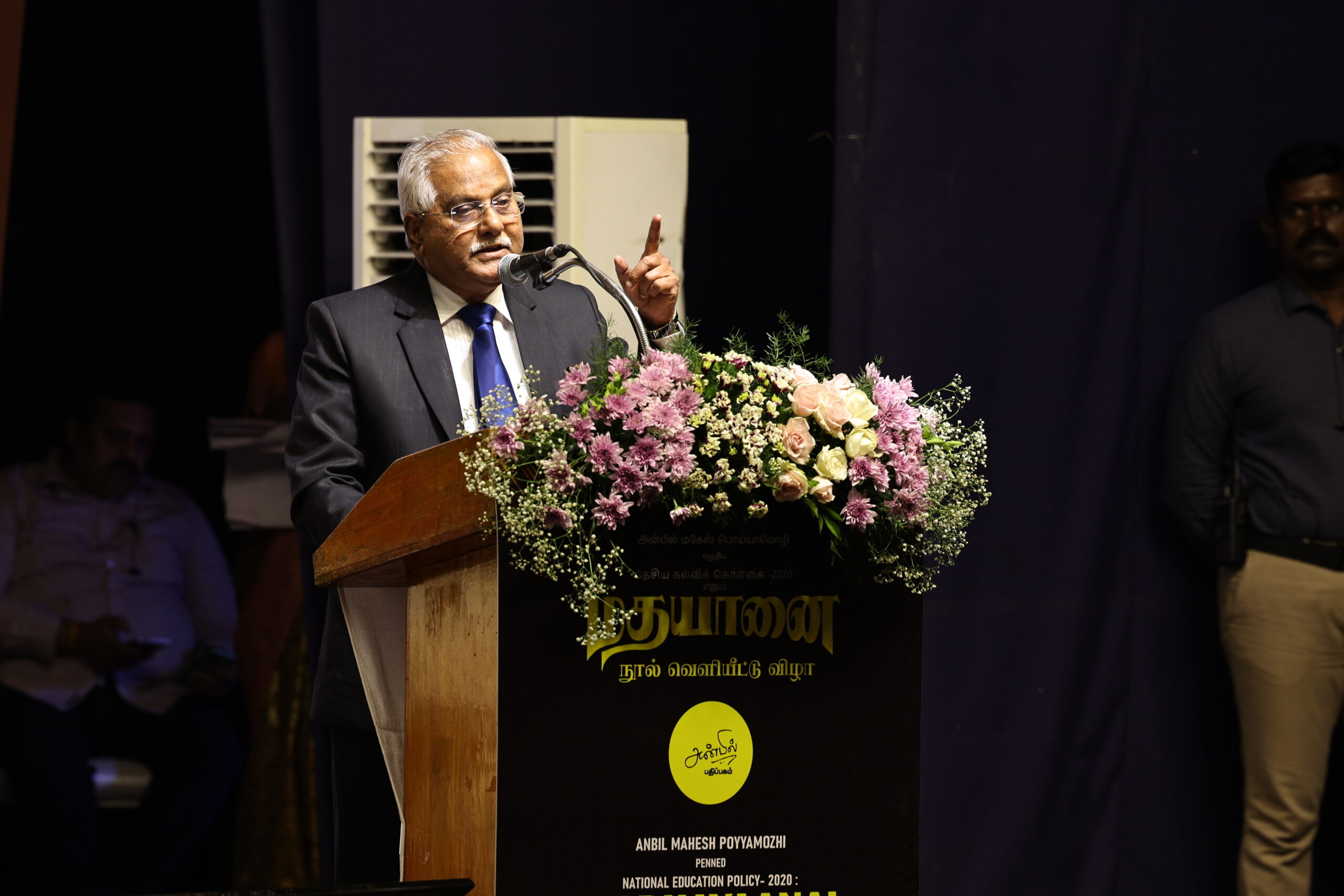
What is the National Education Policy (NEP)?
The National Education Policy runs contrary to the cultural values and the rich social fabric of the people of India. It stands in opposition to the educational principles laid down in both the 1968 and 1986 policies. The 1986 policy, formulated under then Prime Minister Rajiv Gandhi, clearly stated that the Constitution embodies the principles on which the national system of education is based. The concept of a national system of education implies that, up to a certain level, all students—regardless of caste, creed, or location—should have access to quality education of a comparable standard. To achieve this, the government is expected to implement well-funded programs and take effective measures. This direction was clearly outlined in Paragraph 3.2 of the 1968 Education Policy, which recommended the establishment of a Common School System.
The current NEP has been introduced without consulting the state governments of the Union of India. However, as reaffirmed by the Supreme Court in the Bommai case, the federal feature is part of the basic structure of the Constitution. Can anyone override this? What authority does the Union Government have to impose such a policy unilaterally, when the Constitution Bench of the Supreme Court has declared federalism as part of the Constitution’s basic structure? States are empowered and have a constitutional duty to frame their own educational policies. It is the responsibility of state governments and union territories to educate their children, nurture a knowledge society, bring all communities into the mainstream, and build responsible citizens. The Union Government has no right to interfere in this domain through an executive policy like the NEP, which fails to serve the common man, rural communities, and tribal populations. Instead of uplifting the marginalised, this policy further oppresses the oppressed—particularly Scheduled Castes, Scheduled Tribes, and backward classes. Should we permit this policy to be implemented unchecked? That is why I stand before you—as a former judge of supreme court—with a duty to alert the people. This policy directly contradicts the Constitution and the foundational principle of social justice. We must resolutely oppose this National Education Policy. It should not be implemented, not even in part.
The Government of Tamil Nadu has shown courage and clarity in stating that it will not implement NEP or accept NEET. The policy is unjust and discriminatory. Can we compare a child from a tribal hamlet in Tirunelveli with a student from an elite urban school in Delhi? Can we expect both to appear in the same entrance exam for medical college, super-specialty seats, or postgraduate courses, and compete fairly? Is this acceptable? It is not. Dear friends, this NEP is also a threat because of its three-language formula, which is nothing but a Trojan horse for Hindi imposition. Tamil Nadu has been resisting Hindi imposition for decades—from 1937 to the 1965 agitations. Tamil Nadu has followed the two-language formula, namely Tamil and English, which has worked well so far. How can the NEP now push a so-called “flexible” three-language formula? In reality, it forces non-Hindi speaking states to adopt Hindi, while Hindi-speaking states face no obligation to learn Tamil or any other southern language. This is linguistic injustice. Why should our children be forced to learn Hindi? Why should we compromise our identity in the name of a one-sided national integration? Let me say it clearly: Tamil Nadu has unequivocally rejected the three-language formula. We reject the veiled imposition of Hindi. We reject linguistic domination, which poses a threat to Tamil language and culture.
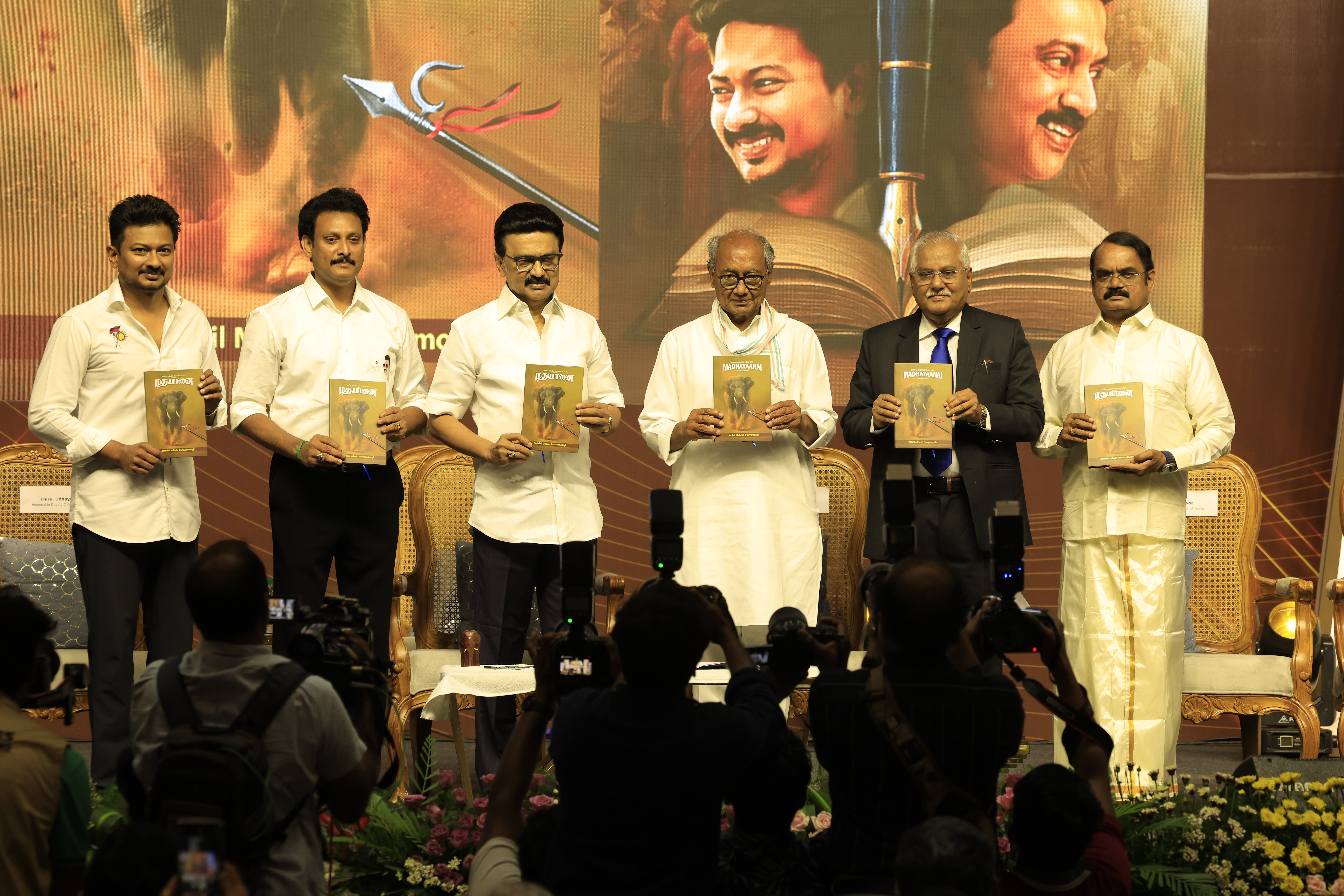
Tamil is not just a language—it is one of the world’s oldest living classical languages, with a rich literary, philosophical, and scientific tradition that remains unmatched in its depth and diversity. Yet, NEP 2020 places disproportionate emphasis on Sanskrit, while offering only token mentions of Tamil. Where is the recognition for Sangam literature? Where is the acknowledgement of Siddha medicine or the rationalist philosophies of our ancestors? This policy promotes Sanskrit at the cost of Dravidian culture, which is either marginalised or erased altogether. This is not inclusive nationalism—it is cultural erasure. And we cannot remain silent. Hindutva Agenda and Communal Curriculum Let us examine the changes already underway in the curriculum. Mythology is being presented as history. Pseudoscience is creeping into science textbooks. Hindu texts are being glorified, while Buddhist, Islamic, Christian, and tribal contributions are ignored. This is not education—it is ideological indoctrination, which must not be allowed in a democratic and secular country like India. NEP 2020 uses terms like “Bharatiya Knowledge Systems” to push a Hindutva-centric worldview—one that is narrow, exclusionary, and majoritarian. But India’s strength lies in its pluralism and secularism. This policy is a betrayal of both social justice and inclusive development. Equality and Access to Education Let us now turn to the issue of equality and access. Tamil Nadu has been a pioneer in using education to uplift marginalised communities through affirmative action. But NEP 2020 lacks merit in this area. It promotes private partnerships and autonomy—terms that are often code for replacing public education with elite, privatised systems.
Reservation policies are being weakened, and entry into premier institutions will increasingly depend on wealth and privilege, rather than equity and justice. What happens to the first-generation learner from Dharmapuri? What happens to the tribal girl from a remote village in the Nilgiris? They are being pushed to the margins. This is not reform—it is regression. And we must resist it at every level and ensure that it is debated and challenged. Tamil Nadu’s Resistance: A Beacon of Hope Tamil Nadu has always been at the forefront of resisting central impositions—be it the Hindi imposition of 1965, or the National Education Policy in recent years. Our people have always stood firm in opposing anti-people and anti-cultural policies. Recognition in education must be rooted in justice, inclusion, and diversity. And Tamil Nadu will continue to lead the way in that resistance. Let us honour that legacy.
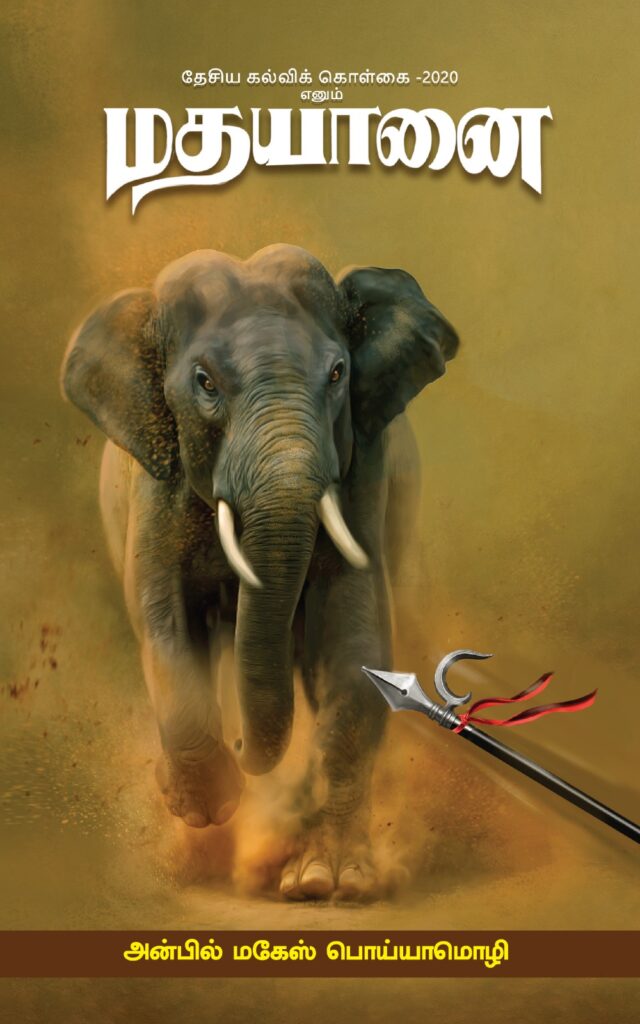
We must oppose the National Education Policy (NEP) 2020—not out of blind resistance, but out of constitutional duty. Let us demand an education policy that respects state autonomy and the federal character of the Constitution. Let us seek a curriculum that promotes scientific temper, as enshrined in the Fundamental Duties under Part IVA of the Constitution of India. We need a structure that guarantees social justice, which is part of the basic structure of the Constitution as upheld by the Supreme Court. After 78 years of independent India and 77 years as a Republic, our villages, our women, our workers, our youth, and our unemployed continue to struggle. The backward classes, the oppressed communities, Scheduled Castes, and Scheduled Tribes still remain marginalised. In many parts of rural India, people do not even get one proper meal a day. That is the harsh reality. We must think about these sections of society—not about the corporate elite, not about those who exploit the rural masses. Our fight must be for the majority who live in the villages and interiors of this country. We must oppose this National Education Policy tooth and nail.
Once again, I congratulate Education Minister Anbil Mahesh Poyyamozhi, a trusted and committed soldier under the leadership of Chief Minister M. K. Stalin. On behalf of the people of this great country, I appeal to Mr. Stalin to continue waging an uncompromising fight against NEP 2020. The autocratic policies, the dictatorial tendencies, and the attempts to reduce the parliamentary strength of South India must not be allowed. You, Mr. Stalin, will be a beacon of light and a national leader in this fight to protect democracy. I wish you all the very best.
Thank you for giving me this opportunity. I extend my heartfelt wishes to each and every one of you—for success, good health, and happiness. Let us all come together to strengthen the hands of Chief Minister Stalin and his cabinet, in their fight against this autocratic and fascist government, to restore governance by the people and for the people, under the Constitution of India. Let me reiterate: Under the Constitution, Governors have now been taught a lesson through the historic judgment of the Supreme Court. This judgment stands as a binding precedent. Any reference made to delay its implementation is unnecessary and invalid. The only remedy, if at all, is through a review or curative petition.
There have been past instances where references were made under Article 143 by the President of India, such as the 2012 reference and the Ram Janmabhoomi case reference—both of which were not answered. So why now? This judgment must be implemented without delay. It is binding—not just on the parties involved, but also on the President of India, the Chief Justice, all Supreme Court judges, and indeed, the entire nation. I believe the people will realise the gravity of the situation. The masses will rise. They will unite to teach a lesson to those who attempt to violate the Constitution. Whether it is the Government of India or any other authority, let them be reminded: In this country, the people are the masters. The people are supreme.
Let them know it.
Thank you once again for this opportunity.
Read about Book park @ Central Metro Station
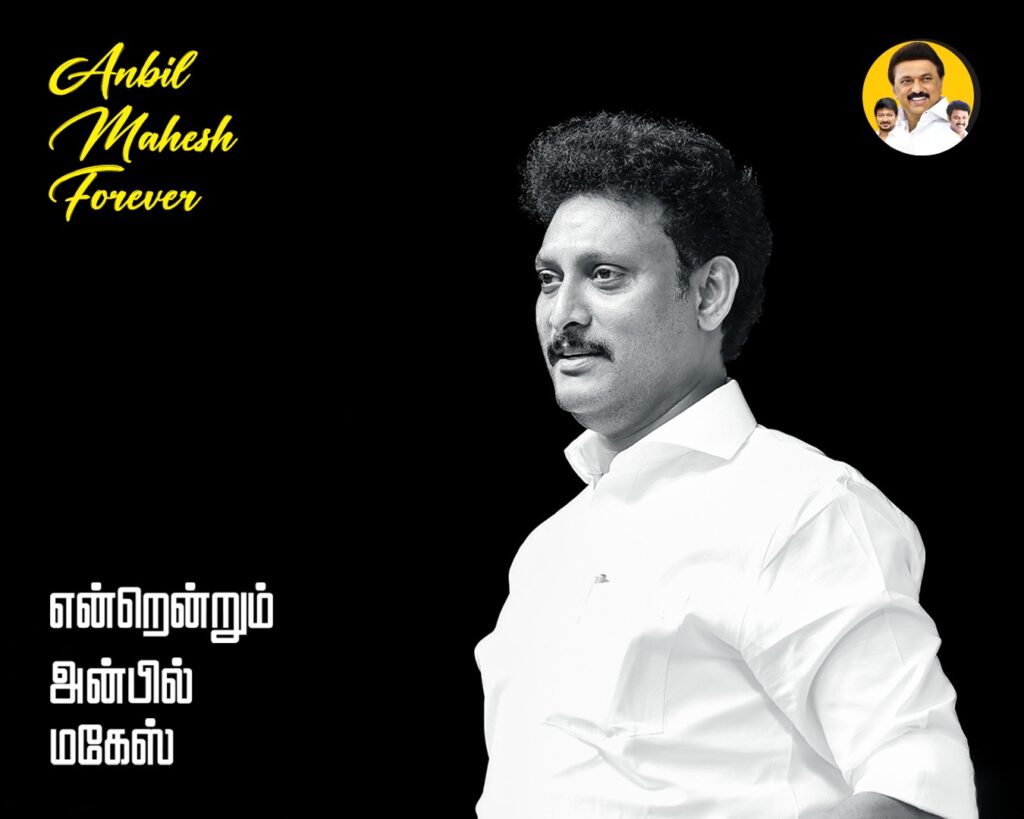
Follow us
Whatsapp Channel – bit.ly/anbilmahesh4evr
X ID – https://x.com/AnbilMahesh4evr
Youtube – https://youtube.com/@AnbilMahesh4evr
Facebook – https://fb.com/AnbilMahesh4evr
Instagram – https://instagram.com/AnbilMahesh4evr

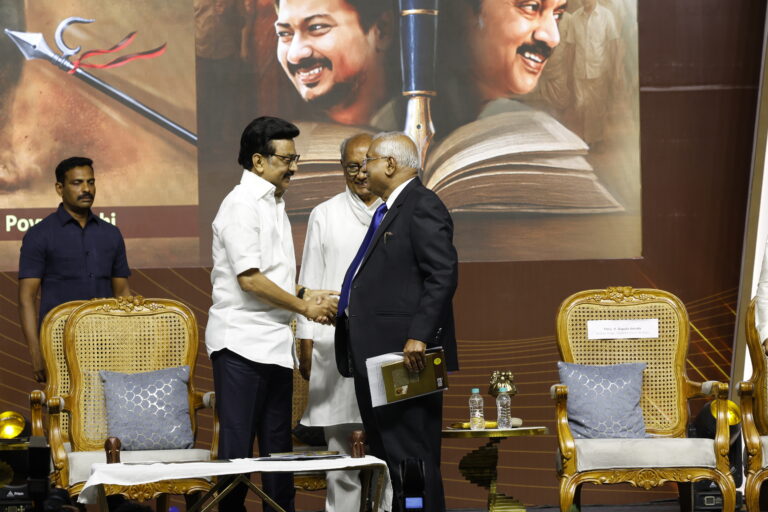
Pingback: “தேசிய கல்விக் கொள்கை - 2020 எனும் மதயானை” நூல் வெளியீட்டு விழா!
Pingback: Book Park: The train to your book-lover’s dream has pulled in—right on time—at Chennai Central Metro - Anbil Mahesh Forever
Pingback: Gallery: NEP 2020 Madhayaanai Book Release Function